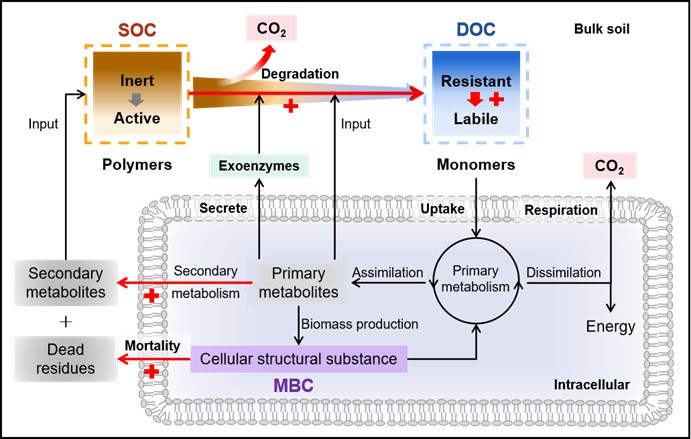南湖新闻讯(通讯员 苏荣琳)8月23日,我校资源与环境学院生态过程与环境效应团队在水稻土有机碳矿化机制方面的最新研究成果以“Warming promotes the decomposition of oligotrophic bacterial-driven organic matter in paddy soil”为题在Soil Biology and Biochemistry上发表。
全球变暖对土壤碳氮循环造成了难以估量的影响。土壤有机碳周转快慢取决于微生物的活动,研究微生物介导的土壤有机碳分解对温度的响应过程,可为预测全球土壤碳动态变化提供科学依据。气候变化的典型表现形式暖冬,会加速冬闲期稻田土壤有机碳的分解损失。长期耕作会使稻田表层和底层的有机碳特性及微生物组成产生差异,但学术界对于它们对大气温度升高的响应、对温度变化的敏感性是否存在差异仍存在认知缺陷。
基于此背景,团队以原状土柱为研究对象,在室内设定温度下培养117天。研究结果表明,0-15 cm表层土壤富含不稳定的溶解性有机碳,表现出高水平的微生物生物量和富营养菌丰度;15-30 cm底层土壤以有机碳含量低且结构复杂为特征,微生物生物量低,其中寡营养菌占据优势。
尽管表层土壤是主要的CO2排放区域,但底层土壤有机碳矿化的温度敏感性更高,促进了顽固性土壤有机质的分解,降低了可溶性有机质的荧光强度。温度升高没有显著改变微生物生物量,但提高了寡营养菌的相对丰度。由于寡营养菌驱动的顽抗性有机质的分解对增温更敏感,全球变暖更易引起底层土壤的碳损失。

图1 增温条件下土壤有机质的周转模式图
本研究从有机质化学性质和微生物代谢策略的角度对稻田土壤有机质矿化的温度敏感性机制提供了新见解,强调在预测未来气候变化与土壤碳的反馈模式时,应加强对深层土壤有机质动态的关注。
研究得到湖北省重点研发项目的资助。我校资源与环境学院博士研究生苏荣琳为论文第一作者,胡荣桂教授为论文通讯作者。资环院赵劲松副教授,吴限博士,博士研究生胡金丽、李华彬、肖恒斌也参与了研究工作。
【英文摘要】
The ongoing global warming is causing paddy soil to come under threat by hitherto unseen levels of carbon and nitrogen loss. The mechanism of soil organic matter (SOM) components and microbial metabolism responding to increased temperature is complicated; for example, the temperature sensitivity (Q10) of SOM decomposition in rice topsoil and subsoil remains poorly understood. In this study, 0–30 cm columns of undisturbed paddy soil were collected and incubated at 5, 15, or 25 ℃ for 117 days to investigate the effect of temperature on SOM decomposition and microbial characteristics in different soil layers. Results showed that Q10 of subsoil (15–30 cm) was more than twice that of topsoil (0–15 cm), indicating that SOM mineralisation in subsoil was facilitated more by temperature than that in topsoil. Warming promoted the decomposition of recalcitrant SOM and reduced the fluorescent intensity of dissolved organic matter. Increased temperature exerted no significant effect on microbial biomass, but it did enhance the relative abundance of oligotrophic bacteria and promote anabolism. Therefore, recalcitrant SOM decomposition driven by oligotrophic bacteria was more sensitive to warming than labile organic matter consumption mediated by copiotrophic bacteria. Our findings revealed the underlying mechanisms by which elevating temperature promoted SOM mineralisation, thereby emphasising the need to remain vigilant regarding the threat to carbon dynamics in deep soil poised by global climate changes.
论文链接:https://doi.org/10.1016/j.soilbio.2023.109156
审核人:胡荣桂